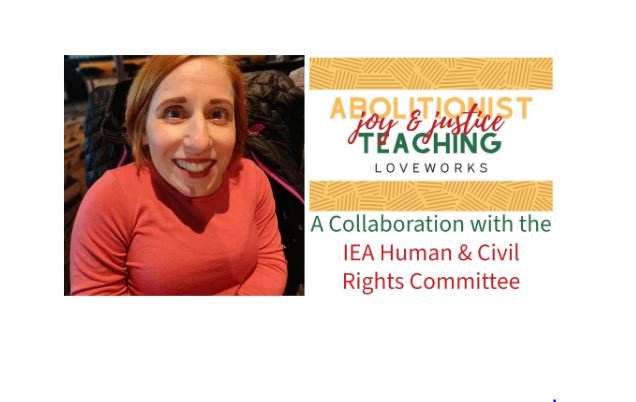Liz Tibble, member of the Illinois Education Association's Human & Civil Rights Committee and co-facilitator of the 'Joy & Justice: Abolitionist Teaching' mini course collaboration, is a great example of IEA member leaders making positive change in their districts and communities. Here is Liz's story.
As a third-generation teacher, Elizabeth Tibble followed her mother and grandmother’s footsteps into education with the desire to give her students a better and different experience than she had at school. “I never wanted a kid to ever feel the way I did about school and learning and so I became a reading specialist.”
With her emphasis on at-risk student populations, Elizabeth saw a discrepancy in education. “Education is supposed to be the great equalizer, but I noticed that there were still so many holes, especially for students of color.” Students were pushed into special education, disciplined disproportionately and their parents often didn’t have the tools to advocate for them. Parents were often very trusting in regard to administrators and the institution of education, but that trust was sometimes taken advantage of. She joined her district’s Equity & Excellence committee in hopes of finding a way to make a difference for parents and students, but it still didn’t feel like enough.
Then, Elizabeth took her first Leaders for Just School class. “It was the definition of an "aha" moment. I had found my people. Through LJS, I found my voice and was no longer afraid to say my thoughts aloud. After completing most of the levels, I started to become more involved in the IEA.” Elizabeth’s involvement in the IEA was motivated by her desire to see a change for her student’s but it was also deeply personal. As a little person, Elizabeth also wanted to be an advocate for teachers like herself who were in need of accommodations. Not content to stop there, Elizabeth continued involving herself in various aspects of the IEA.
Attending her first Ethnic Minority and Emerging Leadership Training in 2022 and sitting in on a Human and Civil Rights committee chat in 2023, Elizabeth knew she had found a way to achieve the change she had wanted. She wanted to be a part of this work and use her privilege as a white woman to help others. “Being part of the EMELT has given me the knowledge, courage, and space to connect with those that think like me and want to do better. Every time we meet as a committee, my mind and soul are rejuvenated and I'm ready to do the work.”
She is continuing in that work in part by co-teaching an upcoming class with Susan Hudson called 'Joy & Justice: Abolitionist Teaching'. The course is inspired by a book study she participated in centered around Dr. Bettina Love’s We Want to Do More Than Just Survive. From participating in EMELT, Elizabeth learned that while she was used to attracting attention as a little person and a white woman in some of these spaces, that it was ok to step back and not be the “voice in charge”. Instead, “Joy and Justice” was created to be more of a podcast style course where she and Susan could invite guests with experience in abolitionist teaching and facilitate discussion. “The goal is to gather like-minded people and push them out of their comfort zone, and to encourage them to educate themselves, ask questions and be challenged in a safe space. It’s an opportunity to dip a toe in the water and see what the work is all about.” She hopes that this opportunity will ignite a spark in people too, because while the work is immense, real change is happening and even more is possible.
